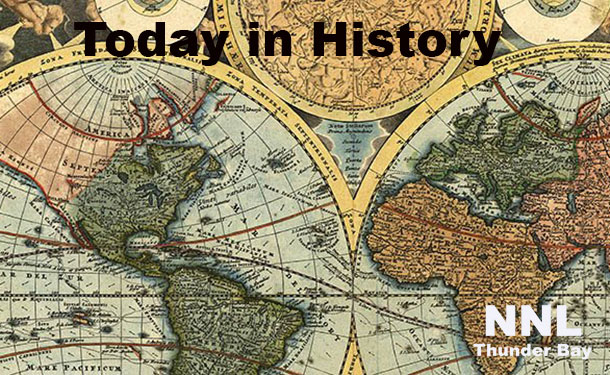Today in History for December 5th
THUNDER BAY – LIVING – Today in History for December 5.
- 63 BC – Cicero gives the fourth and final of the Catiline Orations.
- 633 – Fourth Council of Toledo takes place.
- 1082 – Ramon Berenguer II, Count of Barcelona is assassinated.
- 1408 – Emir Edigu of Golden Horde reaches Moscow.
- 1484 – Pope Innocent VIII issues the Summis desiderantes affectibus, a papal bull that deputizes Heinrich Kramer and Jacob Sprenger as inquisitors to root out alleged witchcraft in Germany.
- 1492 – Christopher Columbus becomes the first European to set foot on the island of Hispaniola (now Haiti and the Dominican Republic).
- 1496 – King Manuel I of Portugal issues a decree of expulsion of “heretics” from the country.
- 1757 – Seven Years’ War: Battle of Leuthen – Frederick II of Prussia leads Prussian forces to a decisive victory over Austrian forces under Prince Charles Alexander of Lorraine.
- 1766 – In London, James Christie holds his first sale.
- 1775 – At Fort Ticonderoga, Henry Knox begins his historic transport of artillery to Cambridge, Massachusetts.
- 1815 – Foundation of Maceió, Brazil.
- 1831 – Former U.S. President John Quincy Adams takes his seat in the House of Representatives.
- 1847 – Jefferson Davis is elected to the U.S. senate.
- 1848 – California Gold Rush: In a message to the United States Congress, U.S. President James K. Polk confirms that large amounts of gold had been discovered in California.
- 1865 – Chincha Islands War: Peru allies with Chile against Spain.
- 1876 – The Brooklyn Theater Fire kills at least 278 people in Brooklyn, New York.
- 1916 – British premier H. H. Asquith resigns from his post.
- 1920 – Dimitrios Rallis forms a government in Greece.
- 1932 – German-born Swiss physicist Albert Einstein is granted an American visa.
- 1933 – Prohibition in the United States ends: Utah becomes the 36th U.S. state to ratify the Twenty-first Amendment to the United States Constitution, thus establishing the required 75% of states needed to enact the amendment. (This overturned the 18th Amendmentwhich had made the manufacture, sale, or transportation of alcohol illegal in the United States.)
- 1934 – Abyssinia Crisis: Italian troops attack Wal Wal in Abyssinia, taking four days to capture the city.
- 1936 – The Soviet Union adopts a new constitution and the Kirghiz Soviet Socialist Republic is established as a full Union Republic of the USSR.
- 1941 – World War II: In the Battle of Moscow, Georgy Zhukov launches a massive Soviet counter-attack against the German army, with the biggest offensive launched against Army Group Centre.
- 1941 – World War II: Great Britain declares war on Finland, Hungary and Romania.
- 1943 – World War II: U.S. Army Air Force begins attacking Germany’s secret weapons bases in Operation Crossbow.
- 1945 – Flight 19 is lost in the Bermuda Triangle.
- 1952 – Great Smog: A cold fog descends upon London, combining with air pollution and killing at least 12,000 in the weeks and months that follow.
- 1955 – The American Federation of Labor and the Congress of Industrial Organizations merge and form the AFL–CIO.
- 1955 – E. D. Nixon and Rosa Parks lead the Montgomery Bus Boycott.
- 1957 – Sukarno expels all Dutch people from Indonesia.
- 1958 – Subscriber Trunk Dialling (STD) is inaugurated in the United Kingdom by Queen Elizabeth II when she speaks to the Lord Provost in a call from Bristol to Edinburgh.
- 1958 – The Preston By-pass, the UK’s first stretch of motorway, opens to traffic for the first time. (It is now part of the M6 and M55 motorways.)
- 1964 – Vietnam War: For his heroism in battle earlier in the year, Captain Roger Donlon is awarded the first Medal of Honor of the war.
- 1969 – The four node ARPANET network is established.
- 1977 – Egypt breaks diplomatic relations with Syria, Libya, Algeria, Iraq and South Yemen. The move is in retaliation for the Declaration of Tripoli against Egypt.
- 1978 – The Soviet Union signs a “friendship treaty” with the Democratic Republic of Afghanistan.
- 1983 – Dissolution of the Military Junta in Argentina.
- 1993 – The mayor of Vienna, Helmut Zilk, is injured by a letter bomb.
- 1995 – Sri Lankan Civil War: The Sri Lankan government announces the conquest of the Tamil stronghold of Jaffna.
- 2004 – The Civil Partnership Act comes into effect in the United Kingdom, and the first civil partnership is registered there.
- 2005 – The Lake Tanganyika earthquake causes significant damage, mostly in the Democratic Republic of the Congo.
- 2006 – Commodore Frank Bainimarama overthrows the government in Fiji.
- 2007 – Westroads Mall shooting: A gunman opens fire with a semi-automatic rifle at an Omaha, Nebraska, mall, killing eight people before taking his own life.
- 2012 – At least 8 people are killed and 12 others injured after a 5.6 earthquake strikes Iran’s South Khorasan Province.
VIDEO by by associatedpress






